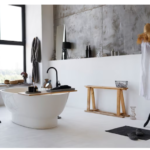Ceramic tile flooring is a popular choice for many homeowners due to its durability, versatility, and aesthetic appeal. Ceramic tiles come in various sizes, shapes, colors, and patterns, allowing you to create unique and personalized designs for your floors. However, like any flooring material, ceramic tiles have pros and cons.
Working with Metro Surfaces can be a great help if you’re considering ceramic tile flooring for your home. They specialize in flooring installation, including ceramic tile. They have a team of experienced professionals who can help you with the entire process, from selecting the right tiles to installing them properly.
Here is a detailed explanation of the pros and cons of ceramic tile flooring:
Pros:
- Durability: Ceramic tile is one of the most durable flooring options, making it ideal for high-traffic areas such as hallways, kitchens, and bathrooms. It can withstand heavy foot traffic, scratches, and stains without showing any signs of wear and tear.
- Water and Moisture Resistant: Ceramic tiles are water and moisture-resistant, which makes them perfect for use in bathrooms, kitchens, and other high-moisture areas. They are also easy to clean and maintain; you don’t have to worry about water damage or mold growth.
- Variety of Styles and Designs: Ceramic tiles come in various styles, designs, colors, and patterns, making them a versatile flooring option. You can create a unique and personalized look for your floors that match your decor style and preferences.
- Low Maintenance: Ceramic tile flooring requires minimal maintenance, and regular sweeping and mopping are enough to keep it clean and shiny. If you properly seal the grout, you can prevent stains and discoloration, extending your tiles’ lifespan.
- Environmentally Friendly: Ceramic tiles are made from natural materials such as clay, sand, and glass, which makes them an eco-friendly flooring option. They are also recyclable, which means they can be repurposed or reused at the end of their lifespan.
Cons:
- Hard and Cold: Ceramic tiles can feel hard and cold underfoot, which can be uncomfortable, especially during winter. You may need to use area rugs or mats to add warmth and cushioning.
- Slippery: Ceramic tiles can be slippery when wet, which can be a safety hazard, especially for young children and older people. You can use non-slip mats or add slip-resistant coatings to the tiles to prevent slips and falls.
- Difficult to Install: Ceramic tile installation can be complex and time-consuming, requiring special tools and expertise. Improper installation can lead to cracking, chipping, and other issues that can affect the durability and appearance of your tiles.
- Prone to Chips and Cracks: Despite their durability, ceramic tiles can still chip or crack if heavy objects are dropped on them or if they experience a significant impact. Replacing damaged tiles can be costly and time-consuming.
- Cold Reflective Properties: Because of the reflectivity of ceramic tile, they can also add to the overall energy consumption of a room, as they do not retain heat well and require additional heating during colder months.
To summarize, ceramic tile flooring is a popular and durable option that is water-resistant, easy to clean, and available in various styles and designs. However, ceramic tiles can be hard and cold underfoot, slippery when wet, and prone to chipping and cracking. They can also be challenging to install and require additional heating during colder months. You can make an informed decision by weighing the pros and cons of ceramic tile flooring.


